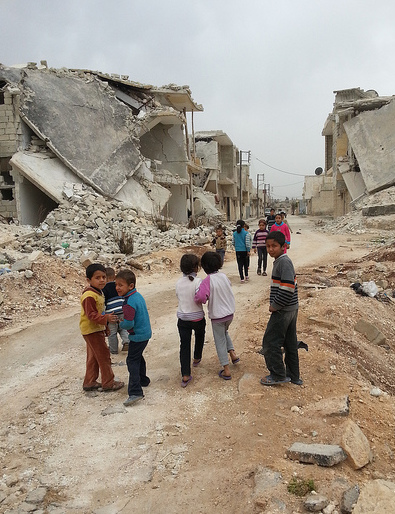Over the past few months during debates at the UN, a number of states and other actors have spoken up to recognise the humanitarian harm caused by the use of explosive weapons in populated areas. A number of actors in the UN system have also recently highlighted this issue.

Children in Azaz, Aleppo governorate in Syria (© IHH Humanitarian Relief Fondation https://flic.kr/p/mC9de1)
At the ECOSOC Humanitarian Affairs segment in June, Costa Rica raised the grave humanitarian impacts that result from such practices. Norway noted that the use of explosive weapons in populated areas was a major cause of displacement, and Liechtenstein called on all parties to conflicts to refrain from such use. The UN’s Humanitarian Coordinator also highlighted that the use of explosive weapons in populated areas played a part in the global crisis in civilian protection.
Also in June, at the UN Security Council Open Debate on the protection of civilians in armed conflict, the UN Secretary-General reiterated his call on conflict parties to minimise the impact of explosive weapons in populated areas in order to prevent harm to civilians. Paraguay supported the Secretary-General’s proposal for a political declaration on the use of explosive weapons in populated areas. Azerbaijan and Montenegro expressed concern at the use of explosive weapons in populated areas, with Austria naming it as one of the most severe current challenges to civilian protection, highlighting their support for the objective of a political commitment as well as commitments made at the World Humanitarian Summit on this issue. Spain also highlighted the raising of the explosive weapons issue at the World Humanitarian Summit.
At the Preparatory Committee of the Convention on Certain Conventional Weapons (CCW) in August, the International Committee of the Red Cross encouraged states to exchange their views on the issue of explosive weapons at the CCW’s Review Conference in December. New Zealand and Ireland also highlighted the humanitarian impact of explosive weapons, and the need for states to explore ways forward to minimise this harm.
At the UN Security Council Open Debate on Children and Armed Conflict in August, the head of UNICEF, Anthony Lake, gave significant attention to this issue in his statement. Quoting statistics on civilian casualties for 2015 from Action on Armed Violence, which revealed almost 44,000 recorded deaths and injuries from explosive weapons last year, of which nine out of ten were civilians when the weapons were used in populated areas, he also noted that such practices deny children safe access to schools, hospitals and water facilities as well as causing disabilities and presenting new challenges to those who are disabled. He stated: “we all should call on all parties to conflict to commit to protecting children by changing the way they wage their wars, including by ending the use of explosive weapons in densely populated areas.”
Uruguay noted the affects of the use of explosive weapons in populated areas on access to education and humanitarian assistance, with Luxembourg and Sri Lanka also noting the impact on schools and hospitals. The Holy See highlighted that the use of explosive weapons with wide area effects in populated areas exacerbates the dangers for children living through armed conflict, with Belgium calling on all parties to renounce this practice as children are its major victims. Finally, Azerbaijan also noted its support of the Secretary-General’s recommendation that all parties to conflicts should refrain from using explosive weapons in populated areas.
Read our briefing paper for states for the debate on children and armed conflict.
At least seventy states have now highlighted the problem of the use of explosive weapons in populated areas in statements to international forums, with fifty-six calling for action on this issue. All statements for which there is a public record are collected on our ‘Acknowledging the Harm’ page here.
Outside of these debates, UN human rights actors also highlighted new and ongoing concerns resulting from the use of explosive weapons in populated areas in Syria, Ukraine and Afghanistan, with the UN Mission in South Sudan condemning the use of heavy weapons near its compounds where civilians shelter from violence. A report from the UN human rights commissioner on the implementation of the recommendations of the commission of inquiry on Gaza also highlighted the need to accelerate efforts to develop standards to limit the use of explosive weapons with wide area effects in populated ares.
In his latest report on the implementation of resolutions regarding the humanitarian situation in Syria, the UN Secretary-General again expressed concern at the use of explosive weapons in densely populated areas, including the long-term ramifications of the resultant destruction of housing and infrastructure.
At the Meeting of States Parties of the Convention on Cluster Munitions in September, INEW and Handicap International also held side events for states to raise awareness of the harm caused by the use of explosive weapons in populated areas and international moves to begin to address this issue through a political declaration.
